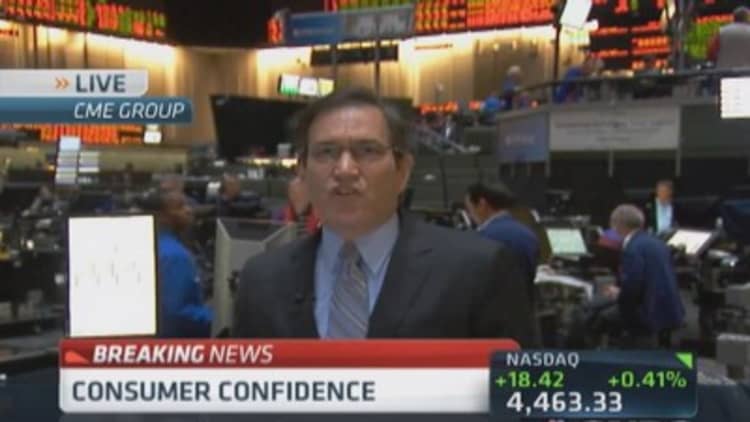Consumers were more confident about the economy in July than they have been in at least six years, The Conference Board said Tuesday, as stock markets float near record highs and expectations build for the recovery.
The Conference Board's Consumer Confidence Index rose to 90.9, above the prior month's showing of 86.4. That was its highest level since October 2007, and well above economists' expectations of an 85.3 reading, according to a consensus survey.
The Present Situation index jumped to 88.3 from 86.3, while the gauge of future expectations rose to 92.7 from 86.4.
David Zervos, Jefferies' chief market strategist, said the data were "fantastic news," especially considering the halting pace of the recovery and stagnant wage growth among consumers.
"We've seen a sort of tale of two cities with the consumer really being a drag and businesses sort of waiting for consumers to start up again and their balance sheets to get repaired and it seems that some of that is coming through," Zervos told CNBC's "Squawk on the Street."

Some pointed to underlying labor market trends in the Conference Board's data that mirror the modest job market recovery.
"There was also further encouraging news for the labor market as the so-called labor differential became less negative, indicating better prospects for unemployment readings," said Andrew Wilkinson, chief market analyst at Interactive Brokers.
Read MoreHere's what may matter more than jobs and earnings
By that metric, "those saying jobs were plentiful rose, while those claiming jobs were hard to get remained static in July. The result was a fall to the lowest level in six years for the labor differential," he said.
The rise in confidence coincides with a stock market surge and relief at the pump, which economists say functions as a de facto tax cut. Over the last several weeks, retail gasoline prices have fallen despite ongoing geopolitical tensions that normally put a ballast under gas prices. Oil markets remain well lubricated with supplies, even as fears over supply disruptions linger in the background.
Still, Capital Economics suggested in a research note the big jump in confidence appeared "a bit suspicious," even in light of falling gas prices.
"Admittedly, it might be that the Conference Board's survey captured more of the most recent drop back in gasoline prices. But we still wouldn't be surprised if this index dropped back in August," wrote Paul Ashworth, chief U.S. economist, in a research note to clients.
Recent economic data have painted a decidedly uneven picture of the economy. While key measures favored by the Federal Reserve—which will render a policy decision this week—are consistent with a broad recovery, others have reflected signs of a setback. On Monday, data showed that home prices fell unexpectedly in May.
Read MoreWall Street worries Fed easing will 'end badly'
"Nevertheless, most of the drivers of confidence are improving, just not quite so dramatically," Capital Economics' Ashworth said, adding that U.S. wage growth has yet to accelerate despite improving sentiment.
"But it was telling that the gap between the number of respondents anticipating an increase in income in this survey and the number anticipating a decline widened to a six-year high in July," the economist said. "That supports our view that wage growth will accelerate in the second half of this year, prompting the Fed to begin raising rates in March next year."
--CNBC's Drew Sandholm contributed to this article.
—By CNBC.com.


